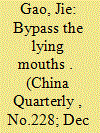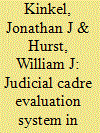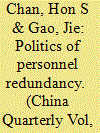| Srl | Item |
| 1 |
ID:
149744


|
|
|
|
|
| Summary/Abstract |
The deliberate distortion of the work accomplishments of local governments is a growing concern for China's leaders in the reform era. How do they tackle this problem and gather reliable data? This study argues that the CCP has developed bypassing strategies to remedy the deficiencies of the statistical system which is vulnerable to artificial data distortion. By employing these strategies, authorities requiring authentic information can directly access the raw data, thereby bypassing lower-level officials who have incentives to distort performance information in the level-by-level reporting process. This study shows that the adoption of bypassing strategies enhances the capacity of the party-state to gather local intelligence. Although the strategies are limited in their ability to ensure the quality of certain types of data, their use should improve the quality of key information on the performance of local governments in the long term.
|
|
|
|
|
|
|
|
|
|
|
|
|
|
|
|
| 2 |
ID:
145743


|
|
|
|
|
| Summary/Abstract |
Performance evaluation systems fundamentally shape the behaviour of Chinese judges, but scholarship on the concrete implementation of these institutions is scarce. Relying on nearly 15 months of fieldwork in six cities in China, we explain how the judicial cadre evaluation system, as unified by the 2011 “Guiding opinion of the Supreme People's Court,” has been implemented. Over 30 indices quantitatively measure Chinese courts’ “fairness” (gongzheng 公正), “efficiency” (xiaolü 效率) and “impact” (xiaoguo 效果), incentivizing court leaders to pressure their subordinate judges to resolve disputes as quickly as possible without unduly angering litigants or other actors. Under the hyper-quantified conditions of cadre evaluation, systemic praising and shaming bring about what we call “intra-state legibility,” which leads to a variety of informal worker reactions to these tactics. This study not only uses interviews and new documentary evidence to add necessary detail to our understanding of cadre evaluation systems, it also engages debates in comparative law and politics regarding bureaucratic influence on authoritarian judicial behaviour.
|
|
|
|
|
|
|
|
|
|
|
|
|
|
|
|
| 3 |
ID:
161059


|
|
|
|
|
| Summary/Abstract |
This study provides an overview of the origin, importance and strength of the non-leading cadre system and argues that the system plays a key role in building resilience in China's bureaucracy. The non-leading cadre system is administratively and politically important because it makes the party-state bureaucracy more adaptable and fosters cohesion among the elite cadre workforce. Although the system may appear to have institutionalized redundancy, this study argues that this redundancy has the benefit of making movement between leading and non-leading cadre status possible. In other words, the non-leading cadre system provides the various levels of the party-state bureaucracy with the leverage to develop their own measures for resolving their own problems. Putting aside the deficiencies in implementation, the non-leading cadre system is likely to remain durable and will help to develop an agile and resilient personnel management system, at least in the short to medium term.
|
|
|
|
|
|
|
|
|
|
|
|
|
|
|
|